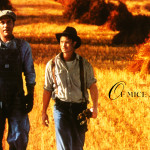Of Mice and Men, a book reflection
Of Mice and Men – a Report by John Smyth
Of Mice and Men was written by John Steinbeck in the 1930s about the sad conditions of the poor migrant farm workers who ate and slept at apartments made for them on farms. This was called a “bunkhouse” in the book. When they didn’t have an apartment at a farm, then they slept outside and quietly experienced the weather for better and worse. A way of seeing what they were was as performers who always played a bit part in the farm economy and died in a poverty that was all-encompassing personally, economically, and emotionally. Even when they were successful, they were tragic figures. And this was the setting for Lennie and George’s self-destructive experience.
Lennie and George early saw each man as a complement to the other. George was small and smart. Lennie was autistic and big and strong. He was raised by his aunt and abandoned when she died. George became a brother to Lennie who had no family. They always were together and Lennie followed George’s advice. Sometimes Lennie’s intuitive side let him appreciate that something was not right, but George’s logic always trumped it. Really, the very plot of the book revolves around the demonic mental side of man’s existence and his spiritual intuition to surrender to the way of the heart. As the plot unfolds, a choice is made to betray brotherhood and friendship for convenience and the will of a misunderstanding mob. Everyone loses innocence except Lennie, who gives his life but keeps his heart and goodness.
From the beginning, Lennie is taken advantage of. Sometimes he knows it and sometimes not. He is always surrounded by smarter, more worldly people. Sadly, they attempt to use him for their advantage. This is the world he lives in. Even his friend George is like this. Always self-centered and successfully controlling, George is the world. The story compares the simplicity and purity of Lennie’s world to the sophisticated dirtiness of George and every other person’s cheap angle on life. I am impressed by the contrast and see it as a biblical allegory even Christ-like except Lennie has no mission to redeem. But he is a lamb led to slaughter.
The story was so sad that I wanted to cry and I passionately wanted to scream and yell that it wasn’t fair for Lennie to die. Everyone else ends up ok but Lennie and his ignominious way end. I learned that horrible things happen to autistic people. Our world desperately needs the goodness, simplicity, and pure, child-like intent of Lennie. There is a Lennie in each of us. Everyone’s Lennie wants to express itself and our George and the crowd kills it. We need to care for our Lennies in the world and in us.
This book released many fears in me, especially the fear that if something happened to my family, I would be vulnerable like Lennie. And I am more motivated to educate and help people understand about autism. Everyone thinks we can help what we do and we can’t. When we do what we do, we never intend the bad consequences. Autistic people like Lennie need understanding and help. For all of us, we need to do more. A succinct statement is that Lennie could be anyone. All of us are in need of understanding and love.

